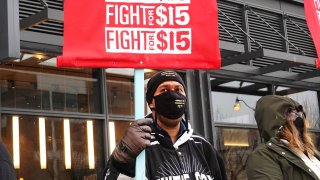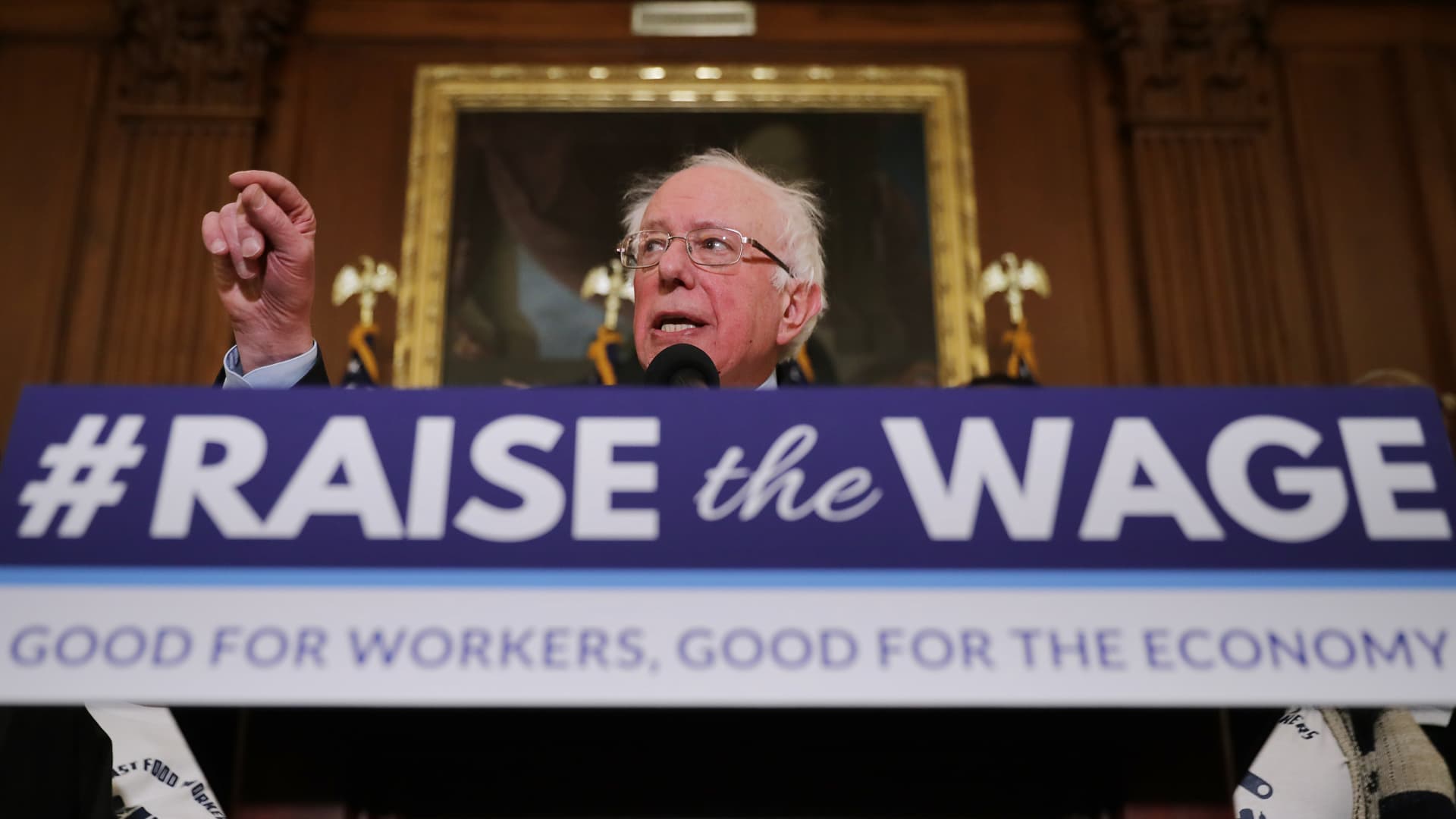
A $15 per hour federal minimum wage may be closer than ever, as Democrats in Congress push to pass legislation that includes the pay boost through a sped-up process that doesn't require Republican support.
Still, it's unclear if it will work.
The $15 federal minimum wage is at the forefront again in Washington after President Joe Biden included a measure to increase the minimum wage in his $1.9 trillion coronavirus aid package to help the U.S. economy recover from the impact of the pandemic.
In addition, Democrats on Tuesday reintroduced the Raise the Wage Act, which would increase the minimum wage to $15 an hour by 2025. An earlier version of the act was passed by the House in 2019, but didn't see a vote in the Senate, then controlled by Republicans.
More from Invest in You:
Here's a 12-month roadmap to financial wellness
Take these steps to shake off anxiety and take control of your financial life
Can't afford an estate plan? What you can do without spending a fortune
Democrats are attempting to pass the minimum wage boost through budget reconciliation, a quicker process that means they don't need any Republican support for the bill. Instead, Vice President Kamala Harris would cast a tiebreaking Senate vote.
Passing the legislation through reconciliation has drawn support from lawmakers such as Sen. Elizabeth Warren, D-Mass., and Sen. Bernie Sanders, the Vermont independent and soon to be chairman of the Senate Budget Committee.
Money Report
"If we cannot get enough Republicans to vote for this legislation under regular order, we simply cannot take no for an answer," said Sanders during a Tuesday call with reporters. "We must raise the minimum wage to $15 an hour through budget reconciliation by a simple majority vote in the Senate."
The House and Senate are expected to kick off the reconciliation process in coming days, even as 10 Republican senators on Monday floated a smaller $618 billion coronavirus relief plan. The proposal doesn't include any increase to federal minimum wage.
Can a $15 minimum wage be passed via reconciliation?

Still, it is unclear if Democrats will be able to include the minimum wage hike in a bill to be passed through reconciliation. To be eligible for reconciliation in the Senate, policies must be tied to the budget and impact outlays and revenue — they can't be incidental.
Democrats could argue that a higher federal minimum wage does have a direct effect on the budget, but it's unclear if that will work or if that's the route they will take, said Sarah Binder, a political scientist at George Washington University and the Brookings Institution.
"There's an outside chance you could do it through reconciliation, but I think what I take away from this is, in fact, you need a supermajority and Republican support to get this done," she said.
Some data shows that boosting the minimum wage would have an impact on the federal budget, however. In paper published Friday, Michael Reich, a professor of economics at the University of California, Berkeley, estimated that raising the minimum wage to $15 a hour would have a positive effect of $64.5 billion per year on the federal budget once fully implemented in 2025. The boost will come, in part, from increased payroll tax revenue, he said.

Another study from the Economic Policy Institute, a left-leaning research group, and shared with CNBC, found that a $15 minimum wage would reduce expenditures on public assistance programs by $13.4 billion to $31 billion. It would also boost payroll tax revenue by $7 billion to $13.9 billion.
"These are sizeable figures that would have a meaningful impact on the federal budget," said David Cooper, who co-authored the EPI report with Ben Zipperer and Josh Bivens.
Democrats could take the $15 minimum wage provision out of any bill they may pass through reconciliation and attempt to pass it as a stand-alone or with other legislation. But that would require all 50 Senate Democrats to agree on the legislation and gather votes from at least 10 Republican senators, said Steven Smith, a political science professor at Washington University in St. Louis.
That's unlikely, he said.
"The Senate Republicans are a pretty conservative lot," he said. "Once you get beyond three or four of them, you probably can't find votes for it."
The benefits and costs of $15 minimum wage
Raising the federal minimum wage to $15 an hour over time would increase pay and may reduce poverty. A study from the Congressional Budget Office found that a minimum wage increase to $15 by 2025 would boost paychecks for roughly 27 million American workers and lift 1.3 million out of poverty. The same study also found that 1.3 million people may become jobless because of the impact on businesses.
But the CBO's estimates about job losses are more negative than expected, according to Ben Zipperer, an economist at the Economic Policy Institute.
"The benefits of the policy far outweigh the potential costs," he said, adding that it would also help the most vulnerable Americans hit by the pandemic, especially people of color. An EPI analysis of the 2019 Raise the Minimum Wage Act found it would help 25% of Black workers and 19.1% of Hispanic workers. By comparison, it would affect 13.1% of White workers and 10.8% of Asian workers.
The U.S. population is largely in favor of boosting the minimum wage. A 2019 Pew Research Center survey found that two-thirds of Americans support a raise to $15 an hour. And a number of states, including New York, New Jersey, California, Illinois and Florida, have already passed laws to raise local minimum wages to $15.
SIGN UP: Money 101 is an 8-week learning course to financial freedom, delivered weekly to your inbox.
CHECK OUT: Digital nomad makes $600 a month in passive income: Here are her top tips via Grow with Acorns+CNBC.
Disclosure: NBCUniversal and Comcast Ventures are investors in Acorns.






